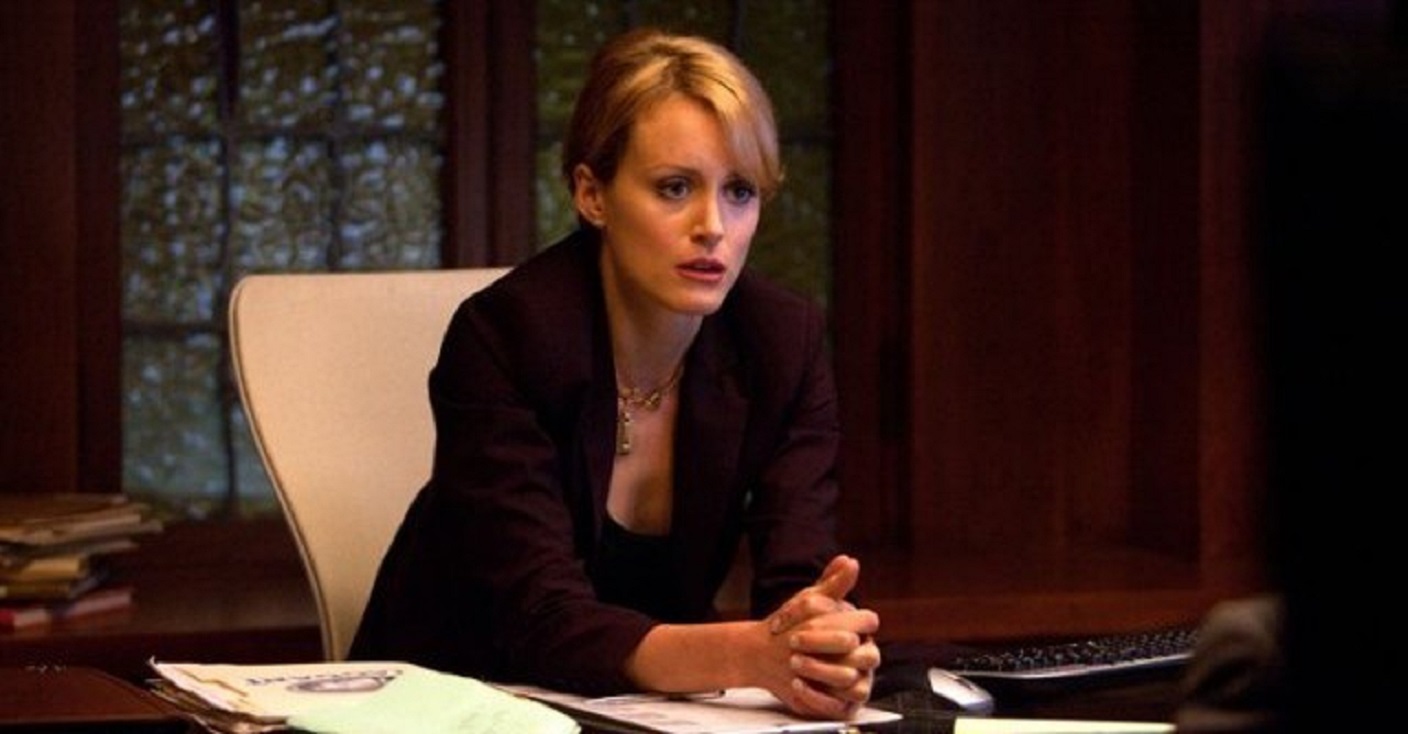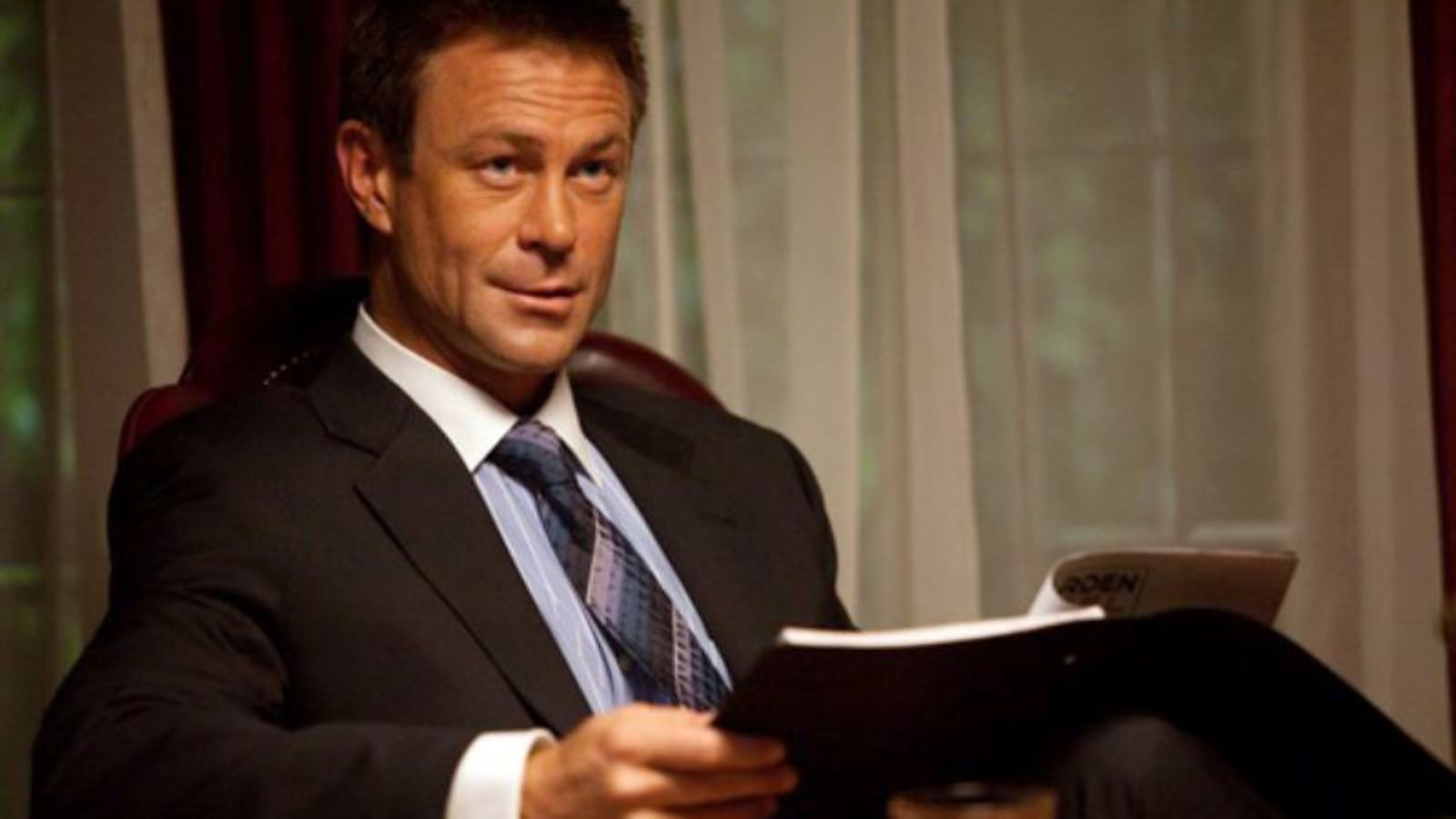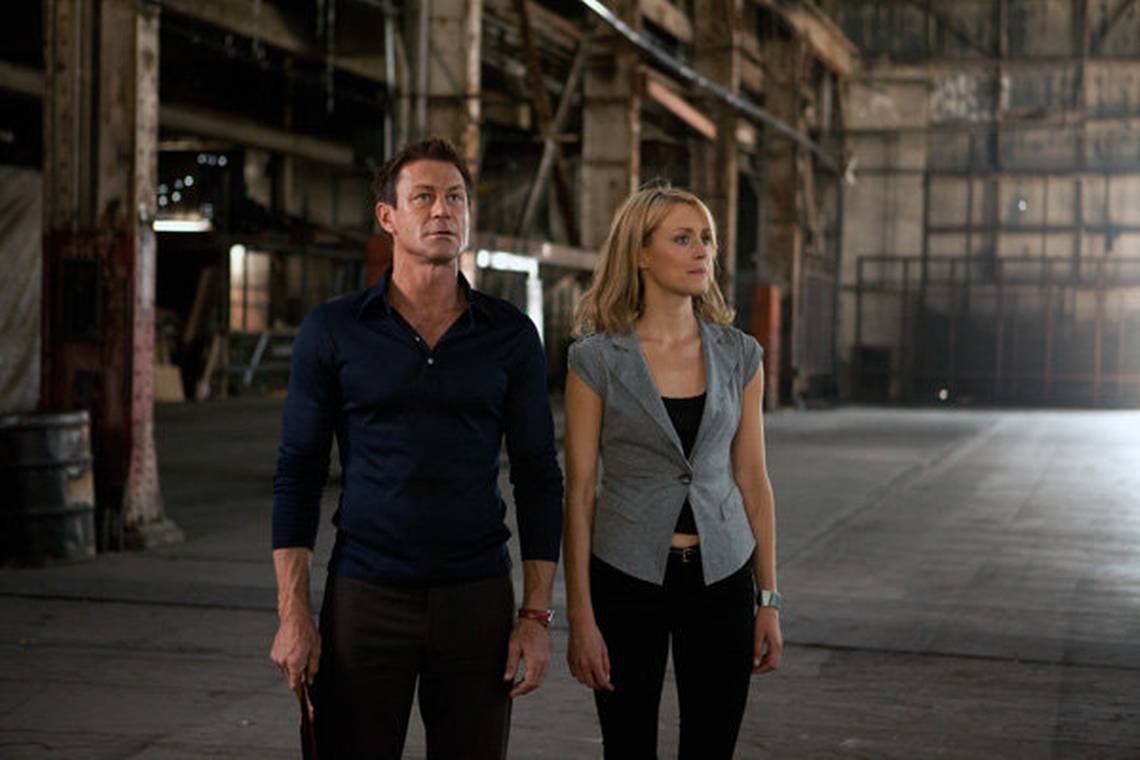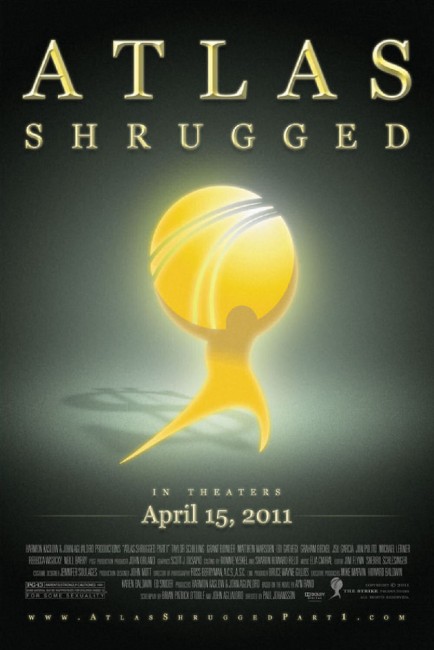aka Atlas Shrugged – Part I
USA. 2011.
Crew
Director – Paul Johansson, Screenplay – John Aglialoro & Brian Patrick O’Toole, Based on the Novel Atlas Shrugged by Ayn Rand, Producers – John Aglialoro & Harmon Kaslow, Photography – Ross Berryman, Music – Elia Cmiral, Visual Effects – Stargate Studios (Supervisor – Mark Scott Spatny), Special Effects Supervisor – John C. Hartigan, Production Design – John Mott. Production Company – The Strike Productions
Cast
Taylor Schilling (Dagny Taggart), Grant Bowler (Henry ‘Hank’ Rearden), Matthew Marsden (James Taggart), Graham Beckel (Ellis Wyatt), Edi Gathegi (Eddie Willers), Jon Polito (Oren Boyle), Rebecca Wisocky (Lillian Rearden), Patrick Fischler (Paul Larkin), Michael Lerner (Wesley Mouch), Jsu Garcia (Francisco D’Anconia), Neill Barry (Philip Rearden), Ethan Cohn (Owen Kellogg), Geoff Pierson (Michael ‘Midas’ Mulligan)
Plot
It is the year 2016 after the United States has economically imploded. With the collapse of oil production in the Middle East, there has been a renewed resurgence in rail transportation. One of the biggest monopolies in the business is Taggart Transcontinental, although this is suffering from poor decisions made by CEO James Taggart. James’s sister Dagny, who co-inherited the company from their parents, decides behind his back that Taggart Transcontinental will build a new line across Colorado using the tough, ultra-light Rearden Metal. James protests that Rearden Metal is untested and believed to be unstable but Dagny, who has an engineering degree, is certain. Through negotiations, Dagny and manufacturer Hank Rearden form an admiration for one another’s tough individualistic principles. Hank is in an unhappy marriage and he and Dagny eventually become lovers. At the same time, they puzzle over the increasing number of disappearances of high-level entrepreneurs and executives. As they investigate, they hear the mysterious phrase “Who is John Galt?” being frequently mentioned. They are both forced to deal with the weak liberal cronyism and protectionism that infects Congress, which passes laws limiting the number of companies an individual may own and ordering Rearden to produce less steel so that competitors might have a chance, while hearings are held trying to discredit Rearden Metal. Against this opposition, Dagny and Hank push ahead to complete the Colorado line.
Ayn Rand (1905-82) is a figure of some controversy in American political/philosophical thought. Though she published several works of fiction, Rand is largely known for her philosophy, which she called Objectivism. The central tenet of Objectivism is a belief in ‘the virtue of selfishness’. Ayn Rand rejected any idea of altruism or doing good deeds for others and believed ardently that the best vehicle for individual self-determination was American entrepreneurial capitalism. She despised Communism and socialism – indeed, in the late 1940s she gave evidence before the House Committee on Un-American Activities out of which emerged the McCarthyist anti-Communist purges.
Rand was born in Russia and was present during the Russian Revolution of 1917. Her experiences during the early years of the USSR were formative to her philosophy and outlook, during which her father’s pharmacy was commandeered by the Bolsheviks and her family reduced to poverty, while a few years later she was forced out of university during anti-Semitic purges. In 1925, Rand came to the USA and stayed there, marrying Frank O’Connor to attain citizenship.
She worked various jobs around Hollywood and became a published writer with the novel We the Living (1936) based on her life in the Soviet Union, as well as several plays and screenplays. She published three other works of fiction, the novella Anthem (1938), another work of science-fiction, The Fountainhead (1943), which was later made into a film The Fountainhead (1949) starring Cary Cooper from a screenplay by Rand, and Atlas Shrugged (1957). Atlas Shrugged was the last work that Ayn Rand would write within her lifetime and is considered a best-selling literary classic, although it is often hard to tell if these claims about its greatness and literary stature are ones being promoted by Randian enthusiasts. The latter years of her life were spent creating an organisation and newsletter designed to promote her philosophies.

The irony about Ayn Rand is that she placed such fierce determination into articulating the belief that those who succeed are being shackled by liberal laws that demand fair play, that businesspeople be allowed to reap the fruits of their own hard work and not have it taken away from them, yet she herself never owned a business and was never employed in a corporate environment. She did odd jobs in Hollywood but married soon after coming to the US and was for many years supported by her husband – at least until her success as a writer. The career she pursued for most of her life was the solo profession of a writer – not one where she had any responsibility for earning her way up or managing a corporation or where she had to deal with underlings or competitors. At most, you can look to her management of the Ayn Rand Foundation, although from all accounts that worked as an organisation where there was what Ayn Rand wanted or the highway.
Needless to say, the arguments that Ayn Rand makes about entrepreneurs in Atlas Shrugged are straw figure arguments rather than ones that ever seem informed about how people in reality act in a business environment. In the film, the people around Hank Rearden are either social parasites, such as the wife (Rebecca Wisocky) who makes an over-exaggerated display of disdaining the bracelet that Hank has made from Rearden Metal, or are deliberately loathsome liberals such as the brother-in-law who asks for a donation to his charity and then wheedlingly asks that Hank do it anonymously. A clearly liberal and corrupt Congress enacts laws necessitating that successful companies are not allowed to fire any of their employees, are despising of any thriving businesses and determined to level the playing field by artificial means so that weaker competitors can have a chance. The film even features a scene where Dagny threatens to fire every employee of a union when its rep tries to tell her that its people will not run on the John Galt line because of concerns about safety.
Conservative political fantasies have a bad habit of being regarded as laugh riots by audiences – see the likes of Gabriel Over the White House (1933), Red Planet Mars (1952), The Green Berets (1968), Red Dawn (1984) and An American Carol (2008). It is important to remember that Ayn Rand wrote Atlas Shrugged as a social fantasy, which gives it a certain number of brownie points in terms of not needing to be realistic. However, the truth of what Ayn Rand imagined the world to be and what it has subsequently emerged as in reality is so gapingly vast as to be laughable.
It is more than clear that Ayn Rand latched onto capitalism as an ideal of freedom in contrast to the bitterly hated regime of Communism under which she grew up. Indeed, the liberal counterarguments that she presents here are all taken from Communism, not US left wing thought. The scene where Hank is told that he has to stop producing so successfully so that lesser companies might have a chance is a classic argument about the Soviet quota system, not anything that has ever existed in US capitalism. There is also the example of the 20th Century Motor Company where Dagny and Hank find the static electricity motor. Before they enter, he gives a speech about how the company collapsed due to the fact that all of the workers were given equal pay, killing off the motivation for self-advancement and punishing those who were successful. Again, this is a lecture that seems pointedly about the Communist system rather than any form of corporate tradition that has ever been practiced in the United States.

The great flaw in Ayn Rand’s outlook is that she assumed every entrepreneur she championed would play the game honestly and fairly. The real world has shown this to be far from the case. Capitalism’s flaw is that it is based on the few maximising a limited number of resources and convincing a finite number of the world’s population to buy these things. Time and time again has shown that the companies that rise to the top have to conduct unscrupulous deals to get the advantage – driving wages and workers rights down, selling products they know to be inferior or flawed, using blatantly misleading advertising to sell something, the knowing use of Third World sweatshops or child labour. Human nature tends to be such that in the absence of laws to impede the way that people behave, those who are most fixated on a goal will usually steamroll over respect of others to gain advantage. Yet Ayn Rand seems blind to any need for the curbing of such behaviour. She seems so fixated on her belief in hard-won individuality that she cannot conceive that anybody so motivated would ever do wrong. Not to mention that in her idea of a utopia where all the exceptional individuals were taken away to be free to pursue their own interest unimpeded, she never seems to ask who it is that would do the menial jobs in this world.
You can see that Ayn Rand was fiercely proud of her abilities and the belief that she had superior intellect than those around her. Her characters are constantly refusing to compromise – both Atlas Shrugged and The Fountainhead are single cries of refusal to concede one’s idealistic stances no matter what the cost. You can equally see that Rand had no tolerance for the social falsity, especially those lesser underlings that sought to ride on her coattails. Atlas Shrugged is almost a single entire spit in the face to those who refuse to recognise and respect that exceptionalism and individuality.
Atlas Shrugged has been promoted as a film project since 1972 and was announced as a tv mini-series in 1980, although none of these versions ever emerged. John Aglialoro, the CEO of a fitness machine company who had no prior filmmaking experience, obtained an option on the rights to the book from the Ayn Rand estate in 1992. A planned filmed adaptation went through various scripts, including in 2007 a big-budget production from Lionsgate that would have starred Angelina Jolie as Dagny Taggart.
The finished film version here, generally referred to as Atlas Shrugged Part I (although as only Atlas Shrugged on the opening credits), was a rush job made on a lowered budget in order to start shooting two days before the option on the rights expired. Previous director Steven Polk bowed out at short notice and was replaced by Paul Johansson, better known as an actor on various tv series including Beverly Hills 90210 (1990-2000), One Tree Hill (2003′) and as the lead in Highlander: The Raven (1998-9), and who had directed nothing else outside of tv episodes.
There does seem something decidedly old-fashioned about a film version of Atlas Shrugged coming out in 2011. At a time when the world is crippled by a recession caused by bankers flagrantly abusing the rules, with Occupy movements popping up around the world demanding accountability from those who have monopolised wealth and where most people now regarding ‘corporate executive’ or ‘banker’ as a dirty word, it seems entirely the wrong time to be making a film that stands up in favour of the heroism of entrepreneurial individualism. One cannot help but wonder what Ayn Rand, if she had lived to see it, would have made of scandals like Enron, Bernie Madoff, Lehman Brothers and the sub-prime mortgage crisis. The principal cause of much of this is after all people enacting exactly the same principles of self-interest, lack of responsibility towards others and doing so in the environment of a lack of governmental interference that Ayn Rand advocated.
It is also hard to believe in an era when rail is increasingly regarded as an obsolete form of transport that people would flock to a film about the business and engineering ins and dramas of the construction of a mighty railroad – the film version does update the story’s milieu to the year 2016, post the economic collapse of the US where it is cannily seen that the peak oil crisis has brought about a return to rail transport in order to make the premise work. This lack of appeal to modern audiences was born out at the US box-office where Atlas Shrugged earned back only a pitiful $1.6 million in theatrical release.

The major problem the film has is simply how to make Atlas Shrugged seem dramatic on screen. The film’s inherent problem is one of the source work being wordy and lacking much drama. Ayn Rand wrote Atlas Shrugged as a political treatise more than a work of fiction – speeches go on for pages at a time, the climactic one that would come in Part III where John Galt outlines Rand’s idea of a libertarian utopia takes up 70 pages.
The other problem is that with the central characters being so motivated by self-interest they are removed from the sympathetic and likeable qualities that you are used to finding in Hollywood heroes and heroines. Grant Bowler’s Hank Rearden seems to disdain his family and especially his wife, is said to have no friends and has a scene where he states that he no interest in altruism when asked to make charitable contributions, while Taylor Schilling’s Dagny is accused of having no emotions by her brother, which seems to be borne out by Taylor Schilling’s frosty performance. When the two characters come to the fore of the film, that leaves the only qualities to admire being solely that they are handsome and good-looking – oh and that they seem to feel they are entitled to be selfish because they are more successful business entrepreneurs than everybody else.
For all its appeal to people who were exceptional individuals, Atlas Shrugged gives the feel of being made by those who were less than exceptional themselves. Indeed, one had never heard of most of the names on the credits before (although there are some names of minor recognition factor in the supporting cast). The film feels shot like a tv movie, although it does at least boast some nicely photographed shots of the Colorado landscape during the latter half.
To be fair to Atlas Shrugged, it works with passable drama – it is not the laughable embarrassment that many of the other abovementioned conservative fantasies are. The only complaint might be that it is unresolved, ending on the hardly dramatic cliffhanger where Dagny races to the hills that Ellis believed filled with oil to find them on fire – we never learn why they are burning with the presumption being that this is a question that we will wait for the sequel to provide the dramatic answer.
Despite the poor box-office reception and almost universally negative critical reception of Atlas Shrugged, producer/co-writer John Aglialoro went onto make Atlas Shrugged II: The Strike (2012) and Atlas Shrugged III: Who is John Galt? (2014), although in each of these the continuing characters have been cast with different actors.
Ayn Rand has also been the subject of several other films – the documentaries Ayn Rand: A Sense of Life (1997), Ayn Rand and the Prophecy of Atlas Shrugged (2011) and the biopic The Passion of Ayn Rand (1999). Elsewhere, Rand wrote two other screenplays Love Letters (1945) and You Came Along (1945), while the films Night of January 16th (1941) and Ideal (2004) were based on her murder-mystery plays, and two films versions were made of her anti-Communist diatribe We the Living, an unofficial two-part Italian version in 1942 and the modern remake We the Living (1986).
Trailer here

